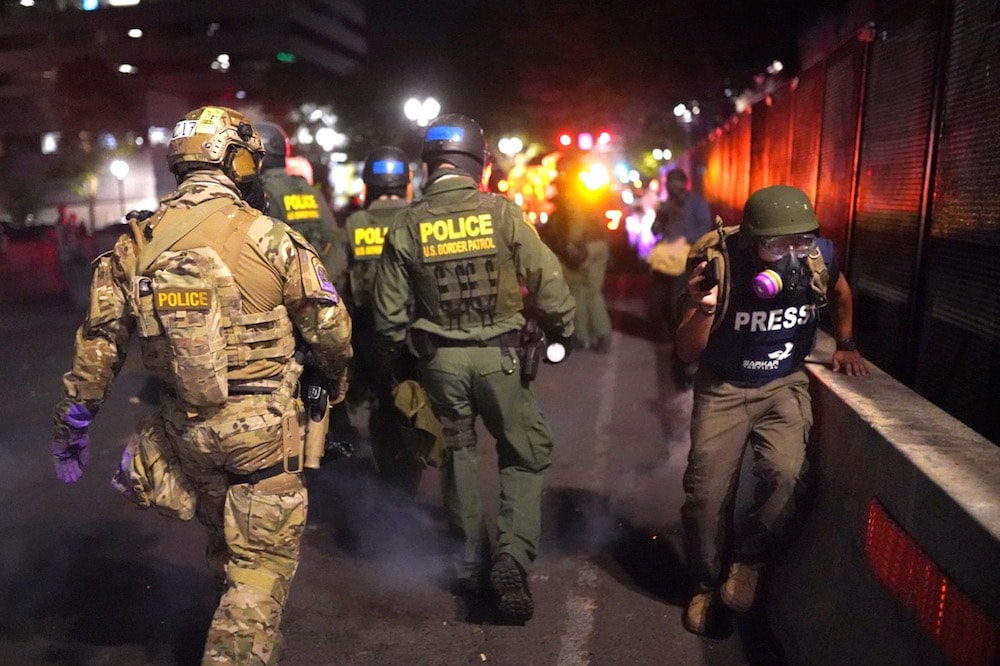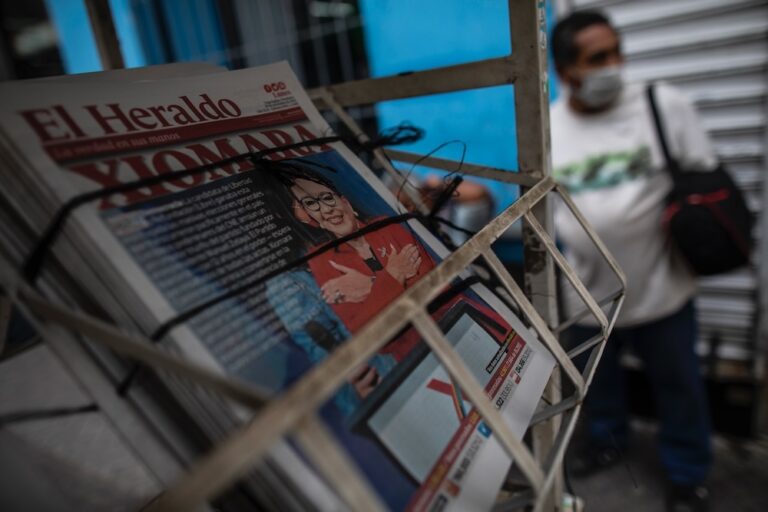October in the Americas: A free expression round up produced by IFEX's Regional Editor Paula Martins, based on IFEX member reports and news from the region.
Curtailed campaigns, civil unrest, visa issues, and an unpredictable political environment – no, this time we’re not talking about Latin America
IFEX member the Committee to Protect Journalists (CPJ) has been partnering with the U.S. Press Freedom Tracker to monitor violations against the press in the United States during 2020. The Tracker has received 850 reports of violations since the May protests. Many of the victims of violence were foreign reporters.
Now, in the runoff to a polarized election marked by disinformation and attacks against the press, CPJ interviewed international correspondents to learn about their experience in covering the protests and the electoral campaign.
One of them, Swedish journalist Nina Svanberg, affirmed that now she has “to be more vigilant around police” and recounts how police officers doubted she was a reporter, despite presenting credentials, and held her for several minutes while covering a demonstration. She says “it’s been difficult to try and explain exactly how volatile, or on-edge things have been this last summer and these last few months.”
Spanish journalist Marta del Vado says she “never thought [she] would see teargas, pepper spray, and rubber bullets being used during a peaceful protest in Washington, DC.” She expressed concerns in relation to how the administration will handle future protests, considering the manner in which the discretionary use of force took place at the country’s capital city.
The journalists also talked about the proposed visa restrictions that could establish a maximum period of stay for representatives of ‘foreign information media’. For dal Vado, “[t]here is a clear objective to make it harder for international journalists to come to the U.S.”
Valeria Robecco, from Italy, talks about the presidential election season: “In the debate between Trump and Biden [several weeks ago], it was basically all attacks, one after the other, and no content on programs or ideas at all. This of course is mirrored in regular conversations between people: you see people that are more aggressive than before when you talk about politics.”
She then shares her concerns with the impact this polarization has on the media, affirming that “[t]here’s a broader sense that people can get away with things because there have been so many actions taken against the media.”
Under this tense environment, Americans head to the polls on 3 November.
Another IFEX member, Reporters Without Borders (RSF), has launched a campaign challenging candidates running for office to publicly commit to upholding the principles of press freedom. They have asked presidential and congressional candidates to sign the #PressFreedomPact:
“ I commit to uphold the principles of the First Amendment in my words and actions, my domestic and international policy and in my governance, to protect the vital role of the free press in American democracy, and to lead by example in upholding democratic values throughout the world.”
The organization has also introduced eight policy recommendations for the presidential and congressional candidates to consider leading up to the US elections:
- The president should affirm his commitment to press freedom in the first 100 days in office.
- Congress should hold a hearing on threats to US press freedom.
- The president and Congress should guarantee open press access.
- Congress should pass and the president should sign a federal shield law.
- Congress should pass and the president should sign an amendment to the Espionage Act to ensure journalists cannot be prosecuted.
- Congress should pass and the president should sign legislation that would strengthen US foreign policy on press freedom.
- The president should prioritize ending impunity for crimes against journalists and redouble his efforts to secure the release of detained journalists globally.
- Congress should renew regulation of online platforms and amend Section 230 to promote reliability of information online.
From the streets to the ballots
On 25 October 2020, millions of Chileans went to the polls to decide on the future of their Constitution. A large majority – 78% – decided that the current Constitution, dating from the times of the military dictatorship in the country, should be replaced by a document prepared by a dedicated Constitutional Assembly, elected by the people. This will be the first time since 1833 that the Chilean Constitution is drafted by an assembly elected by popular vote.
The referendum was approved through a political agreement within Congress following the widespread demonstrations that took over the country in the past years which culminated in the huge protests seen in late 2019.
The Chilean referendum was a victory for democracy and sent waves of hope across the region. Approving a new Constitution has a powerful symbolic meaning, signalling the end of an institutional order set up by an authoritarian regime. It it also an opportunity to introduce important institutional changes that may have a significant impact on structural issues concerning inequality and discrimination in the country.
IFEX-ALC member Derechos Digitales has affirmed that the constitutional process will be an opportunity to re-examine the role of citizens as key agents in the design and assessment of public policies.
Whistleblower criminalized
On 19 October, IFEX Colombian member Fundación para la Libertad de Prensa (FLIP) released an open letter to the Colombian Prosecutor General questioning the opening of criminal procedures against journalist Diana Díaz. Díaz had reported on the practice of censorship in Colombian public media outlets, in particular releasing an audio containing evidence of wrongdoings within the National Radio Television of Colombia (RTVC). The material was sent to FLIP for publishing.
In addition to calling attention to the abusive use of criminal charges against Díaz, FLIP’s letter criticized the Prosecutor’s Office for making use of “illegitimate, unnecessary, unjustified and disproportional mechanisms” to carry out the investigation.
In early October the Prosecutor General also ordered a judicial inspection of FLIP’s offices and the apprehension of documents referring to the registry of visitors received around the date the audio recording was delivered to FLIP. By mid-October, three members of FLIP’s staff were summoned for individual interviews at the General Prosecutor’s Office in relation to the case.
On 21 October, IFEX-ALC, Media Defence, and RSF released a joint statement in support of FLIP and Díaz. The groups requested that the Prosecutor General’s Office respect the work of civil society organizations and journalists, guaranteeing rights such as the right to source protection, and that it comply with institutional directives on the matter. As such, the Prosecutor General should withdraw the charges against journalist Diana Díaz and the proceedings for which FLIP has been summoned.
The many faces of censorship
IFEX members released new reports this month relating to the continuous deterioration of freedom of expression in Brazil. RSF’s brief examines how President Bolsonaro’s strategy for smearing media outlets that annoy him affects the daily lives of journalists and infects other spheres of government. According to the group, during the past quarter this situation has been aggravated by “disinformation, curbs on access to information (designed to control the public debate) and politicization of state communication mouthpieces.”
On 21 October, the Brazilian Association of Investigative Journalism (ABRAJI), IFEX member in Brazil, released the last results of their monitoring: 102 reports of stigmatization of journalists by public authorities in 2020. A 73% increase as compared with 2019. A staggering 72 of the documented occurrences came directly from Bolsonaro. In this category of violations, he is the main perpetrator; his sons (elected as legislators) were responsible for 12 of the accounts.
Another IFEX member, ARTICLE 19, which has a regional office in the country, released its World freedom of expression ranking for 2019/20. In it, Brazil appears as a negative highlight – the country presented the most impressive drop in all rankings carried out by the organization. In total, the country has fallen 46 points in the past 10 years and now occupies the 94th position among 161 nations. Brazil was the worst-ranked country in South America, after Venezuela.
The report indicates that the decline has been accelerating since Bolsonaro took office in early 2019. The organization states that “the 2020 pandemic has made Brazil an example in the extreme of how authoritarian leaders and restrictions on freedom of expression, combined with disinformation, represent a high risk for public health.”
Less funding to protect journalists and human rights defenders in Mexico
On 21 October, the Mexican Senate approved the elimination of 109 public trusts, including the Victims Aid, Care and Comprehensive Repair Fund (FAARI) and the Fund for the Protection of Human Rights Defenders and Journalists.
Prior to approval, a number of the sectors affected asked to be heard before a final decision was reached in relation to the trusts. Their requests were ignored.
Human rights groups affirm that the Fund for the Protection of Human Rights Defenders and Journalists has proven to be an important tool to contribute to the rapid implementation of protection measures in cases of extreme urgency, throughout Mexico.
IFEX-ALC members ARTICLE 19 Mexico and CENCOS say that, despite the need to strengthen the Mechanism for the Protection of Human Rights Defenders and Journalists and establish a comprehensive policy for protecting victims of violence, by making this decision the Mexican State weakens its operation, as well as its accountability and transparency mechanisms, opening up the possibility of the discretionary use of resources.
Numerous Mexican groups released a joint statement requesting Mexican President Obrador veto the measure.
Argentinians, control your data!
This month the Asociación para los Derechos Civiles (ADC) released a new tool to help Argentinians acquire and regain control of their data. The organization launched QuieroMisDatos (I Want My Data), an application that helps individuals prepare and send information requests to companies. The app is user-friendly and avoids legal or technical jargon. It allows users to identify companies, select key questions and address the request to the right recipient.
The app is designed under the philosophy of ‘privacy by design’ and, therefore does not require any personal data from its users.
Cybercrimes in Nicaragua
On 27 October, the National Assembly of Nicaragua approved a new Cybercrimes Law. The law establishes open criminal provisions that may give room for abusive interpretations. It also criminalizes activities that could be considered legitimate exercise of freedom of expression. Article 28, for example, establishes prison sentences for crimes against honour, contrary to established international standards on the subject. The text also criminalizes the spread of “fake” or misrepresented news through communication and information technologies.
Last September, IFEX-ALC warned that, if approved, the law would constitute a serious violation of human rights; in particular, of the freedom of expression and information of the Nicaraguan people. This new development adds to the series of obstacles that the government has imposed, through laws and in practice, on the exercise of these rights.



